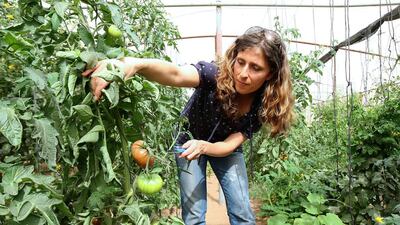The rise of organic farming in the UAE shows no signs of abating. But with the extra expertise needed to grow organic produce, is it a profitable business model?
Organic farmer Elena Kinane, of Greenheart Organic Farms, and Mohammed Salama, of Yas Farm, agree it is not a venture for the faint-hearted.
“If money is your only motivation, organic farming is not a worthwhile investment,” warns Ms Kinane.
She first went into the sector nine years ago, when she launched one of the UAE’s first organic farms, Nasba, with a local partner. The company spent more than two years trialling different crops before opening a shop in Dubai’s Al Manara. Then it all came to an abrupt end.
“The shop was open just three months when it was closed overnight by my business partner, unbeknown to me, while I was on holiday,” says the German-American, 41. “People loved it, there were often queues outside waiting for the truck to arrive from the farm. But my partner didn’t understand that with organic farming, you don’t see immediate returns. He regretted it afterwards, but it was too late.”
Ms Kinane didn’t take long to dust herself off and start again, launching Greenheart Organic Farms in 2011 and opening a shop in Al Barsha a year later.
“There is no textbook on how to farm in the desert and every lesson was hard to learn, but it would have been a waste to just give up,” she says.
This time around, she took over three farms rather than one – “so the risk was spread”.
“Now I am the sole owner of the business, renting the land from landowners who get paid by what I take out of the land,” she says. “That way they are encouraged to make sure electricity and water are working.”
Today, after one landowner switched to non-organic instead, Ms Kinane operates two organic farms in Sharjah, a 45-minute commute from her Dubai home.
But the farmer says the road to profitability was not instant.
“It’s only been in the last two years that we’ve broken even,” says Ms Kinane, who employs 18 staff on her farms and 12 in the shop. “In the last year, we’ve made more money because we have more yields and more greenhouses. Other companies have been able to grow more quickly because they get their produce from various sources.”
This is a strategy adopted by Yas Farm owner Mr Salama, 38, who runs organic farms in Abu Dhabi and Ajman.
He says it only needs to take “one season – six months – and then you start to see profits”, but to ensure he can supply year-round produce, rather than just seasonal, he has also bought organic farms in Egypt, Thailand and Oman. Mr Salama’s latest purchase is the largest hydroponic and organic farm in the UAE, close to Al Shahama, with more than 50 greenhouses and 50 hydroponic rooms.
Mr Salama, who employs 20 staff, opened his farm last year and now delivers fruit and vegetables, milk, buffalo butter and cheese. He says he has experienced 50 to 60 per cent growth year-on-year.
“Making a profit is almost immediate, if you do it in the right way at first,” he adds.
But there are always challenges.
As well as growing fruit and vegetables, Ms Kinane breeds goats and cows for their manure.
“The one thing you don’t have here in the UAE is soil, so first you’ve got to make it using manure,” she explains.
But her small-framed Indian cows, which she opted for over more commonly used dairy cows because they cope better with the UAE’s hot climate, don’t produce much milk.
Ms Kinane claims milking her herd would make for slim returns. “If we were lucky we’d produce about two litres of milk a day, compared with 12 litres from a dairy cow.”
She says the easiest crops to grow organically in the UAE are kale, tomatoes and cucumbers. For Mr Salama, it’s courgette, aubergine and tomatoes.
“The most difficult is corn because it’s so sweet, which means it attracts a lot of insects,” says Mr Salama. For the same reason, fruit is also tricky – and mango, he adds, is impossible.
To deter the pests, Ms Kinane’s cropping strategies include growing leeks or young garlic alongside kale or mixing basil in with several crops.
As well as selling produce from her shop in Al Barsha, she now provides organic fare to 35 businesses in the UAE – a figure that has doubled in the last 18 months – including Freedom Pizza, the Rosewood Hotel in Abu Dhabi, and Atlantis The Palm. The farm also offers home delivery in Dubai and Abu Dhabi.
“The question for us is not how much can we deliver but how much can we grow,” she says. “We told our clients, if you want to work with us, you’ve got to wait – you cannot have everything always available.”
business@thenational.ae
Follow The National's Business section on Twitter

